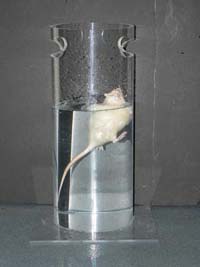
The Forced Swim Test for Depression-Like Behavior in Rodents.
Sign Up to like & getrecommendations! Published in 2019 at "Methods in molecular biology"
DOI: 10.1007/978-1-4939-8994-2_5
Abstract: The forced swim test assesses learned helplessness, which is a feature of depression-like behavior in rodents. This test has also been used in testing the efficacy of existing and novel antidepressant drugs. It is based… read more here.
Keywords: like behavior; forced swim; swim test; test ... See more keywords

Mediation of the behavioral effects of ketamine and (2R,6R)-hydroxynorketamine in mice by kappa opioid receptors.
Sign Up to like & getrecommendations! Published in 2022 at "Psychopharmacology"
DOI: 10.1007/s00213-022-06118-4
Abstract: Emerging evidence has implicated the endogenous opioid system in mediating ketamine's antidepressant activity in subjects with major depressive disorder. To date, mu opioid receptors have been suggested as the primary opioid receptor of interest. However,… read more here.
Keywords: effects ketamine; kappa opioid; opioid receptors; swim test ... See more keywords

Repeated Forced Swim Exacerbates Methamphetamine-Induced Neurotoxicity: Neuroprotective Effects of Nanowired Delivery of 5-HT3-Receptor Antagonist Ondansetron
Sign Up to like & getrecommendations! Published in 2017 at "Molecular Neurobiology"
DOI: 10.1007/s12035-017-0744-7
Abstract: The possibility that stress associated with chronic forced swim (FS) may exacerbate methamphetamine (METH) neurotoxicity was examined in a rat model. Rats were subjected to FS in a pool (30 °C) for 15 min daily for 8 days.… read more here.
Keywords: naive rats; pathology; forced swim; neurotoxicity ... See more keywords

Investigating the metabolic alterations in a depressive-like rat model of chronic forced swim stress: An in vivo proton magnetic resonance spectroscopy study at 7T
Sign Up to like & getrecommendations! Published in 2018 at "Neurochemistry International"
DOI: 10.1016/j.neuint.2018.03.005
Abstract: ABSTRACT Although recent investigations of major depressive disorder (MDD) have focused on the monoaminergic system, accumulating evidences suggest that alternative pathophysiological models of MDD and treatment options for patients with MDD are needed. Animals subjected… read more here.
Keywords: resonance spectroscopy; magnetic resonance; proton magnetic; forced swim ... See more keywords

Paternal environmental enrichment transgenerationally alters affective behavioral and neuroendocrine phenotypes
Sign Up to like & getrecommendations! Published in 2017 at "Psychoneuroendocrinology"
DOI: 10.1016/j.psyneuen.2016.11.013
Abstract: Recent studies have demonstrated that paternal stress in rodents can result in modification of offspring behavior. Environmental enrichment, which enhances cognitive stimulation and physical activity, modifies various behaviors and reduces stress responses in adult rodents.… read more here.
Keywords: enrichment; forced swim; stress; environmental enrichment ... See more keywords

D1- and D2-like receptors in the dentate gyrus region of the hippocampus are involved in the reinstatement induced by a subthreshold dose of morphine and forced swim stress in extinguished morphine-CPP in rats.
Sign Up to like & getrecommendations! Published in 2019 at "Behavioral neuroscience"
DOI: 10.1037/bne0000335
Abstract: Addiction to opioids is an important global problem. Published research has indicated the powerful rewarding effects of drug use, which in the case of opiates like morphine may lead to drug addiction and maladaptive decision… read more here.
Keywords: subthreshold dose; morphine; forced swim; dose morphine ... See more keywords

The N-methyl-D-aspartate receptor antagonist d-methadone acutely improves depressive-like behavior in the forced swim test performance of rats.
Sign Up to like & getrecommendations! Published in 2019 at "Experimental and clinical psychopharmacology"
DOI: 10.1037/pha0000310
Abstract: d-Methadone (dextromethadone) is a noncompetitive N-methyl-D-aspartate receptor (NMDAR) antagonist that binds to the dizocilpine (MK-801)-binding site of the receptor with an affinity comparable with that of well-established NMDAR antagonists. Considering the similar NMDAR activity of… read more here.
Keywords: methadone; forced swim; swim test; receptor ... See more keywords

Considerations of Pool Dimensions in the Forced Swim Test in Predicting the Potential Antidepressant Activity of Drugs
Sign Up to like & getrecommendations! Published in 2021 at "Frontiers in Behavioral Neuroscience"
DOI: 10.3389/fnbeh.2021.757348
Abstract: The forced swim test (FST) was proposed by Porsolt et al. (1977a,b) as a relatively rapid test to identify new compounds with potential antidepressant activity in rats and mice. In this test, the total time… read more here.
Keywords: forced swim; immobility; swim test; antidepressant ... See more keywords

Sex Differences in the Effects of a Kappa Opioid Receptor Antagonist in the Forced Swim Test
Sign Up to like & getrecommendations! Published in 2018 at "Frontiers in Pharmacology"
DOI: 10.3389/fphar.2018.00093
Abstract: There is growing evidence that kappa opioid receptor (KOR) antagonists could be a useful class of therapeutics for treating depression and anxiety. However, the overwhelming majority of preclinical investigations examining the behavioral effects of KOR… read more here.
Keywords: opioid receptor; forced swim; swim test; california mice ... See more keywords